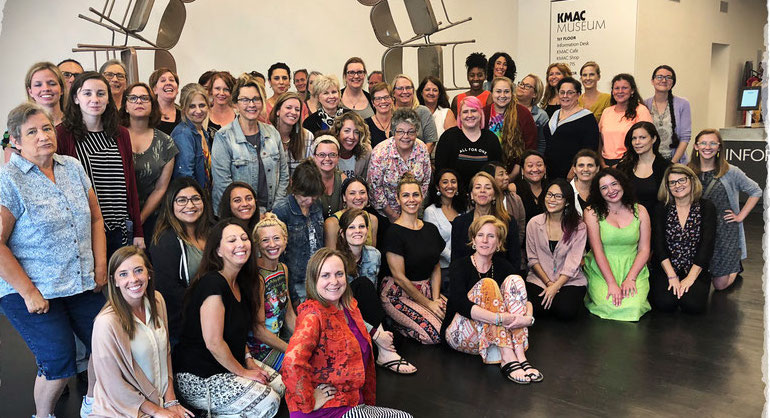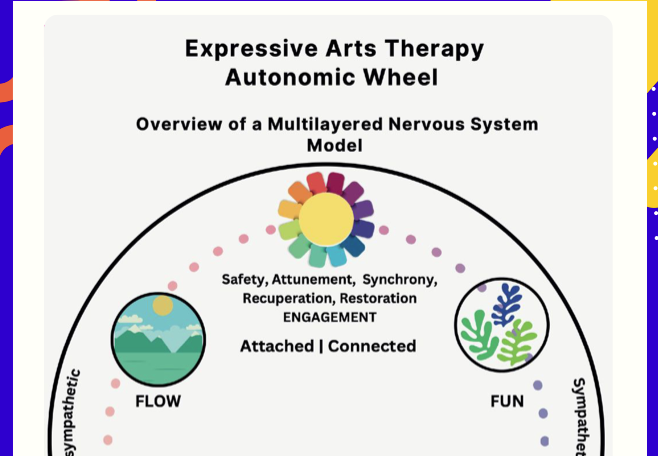
We are so happy to be coming back to KMAC Contemporary Museum of Art this workshop! This course for any practitioner interested in expanding clinical skills for regulation and restoration creatively through Expressive Arts Therapy. Professionals and college level students are welcome to experience and learn evidence-informed approaches (yes, based on Department of Education grant research) to support clients and patients or all ages. This is a 15 hour continuing education workshop that includes an introduction to how expressive arts therapy enhances stress reduction, resources safety, and enhances self-awareness of the senses. The workshop focuses on the latest research and how creative approaches support the autonomic nervous system and self-awareness of body and mind to reduce distress.
Learn and practice how breathwork informs regulation and create "breath journal" for use with clients or your own self-care; how to introduce the foundations of rhythm, attunement, and synchrony through individual and group exploration; explore sensory-based practices that focus on interoception in simple, yet effective ways; and explore using expressive arts therapy methods of evaluation and "arts-based research" that you can use with individuals of all ages in sessions. And come away with an understanding of how expressive arts therapy resensitizes the body and mind-- putting us in states of both "creative FLOW" and "enlivening FUN."
Participants will be able to:
1) define expressive arts therapy as an intermodal, integrative approach to regulation and restoration for counseling, psychotherapy, play therapy, and coaching;
2) define the MSSS (Movement Sounding Storytelling Silence) Model of expressive arts therapy and how it informs counseling, psychotherapy, play therapy, and coaching practices;
3) define at least ten evidence-informed expressive arts therapy strategies that reduce stress;
4) define at least two ways to use breathwork as a cretive approach to body awareness;
5) define why interoception is important to understanding stress and self-regulation;
6) define the Circle of Capacity Model as a complement to the window of tolerance framework in counseling, psychotherapy, and play therapy;
7) define at least three creative practices interoception related to address stress reactions;
8) define at least three ways to apply bilateral movement, rhythm, sound, and drawing to address stress and regulate and restore the self;
9) define the terms synchrony, ventral vagal network, and social engagement;
10) define attunement as an essential concept in supporting stress reduction and trauma recovery through creative and playful practices;
11) identify why rhythm is the foundation of all expressive arts therapy practices;
12) apply at least two rhythm practices for regulation and attunement within counseling, psychotherapy, play therapy, and attachment work;
13) learn to apply the Expressive Arts Therapy Autonomic Wheel to work with people of all ages-- and ourselves, to understand our own nervous systems;
14) identify at least three creative self-care practices to address practitioner stress and distress.

As part of this in-person course, we will offer an additional live webinar that you can attend to meet other participants. Or you can choose to watch this webinar on your own time before our in-person meeting. We will orient you to the workshop, be available for questions, and introduce you to the concepts and practices that you will learn during our time together at KMAC.






 National Board for Certified Counselors (NBCC). Trauma-Informed Practices and Expressive Arts Therapy Institute has been approved by NBCC as an Approved Continuing Education Provider, ACEP No. 6557. Programs that do not qualify for NBCC are clearly identified. Trauma-Informed Practices and Expressive Arts Therapy Institute is solely responsible for all aspects of the programs.
National Board for Certified Counselors (NBCC). Trauma-Informed Practices and Expressive Arts Therapy Institute has been approved by NBCC as an Approved Continuing Education Provider, ACEP No. 6557. Programs that do not qualify for NBCC are clearly identified. Trauma-Informed Practices and Expressive Arts Therapy Institute is solely responsible for all aspects of the programs. 

